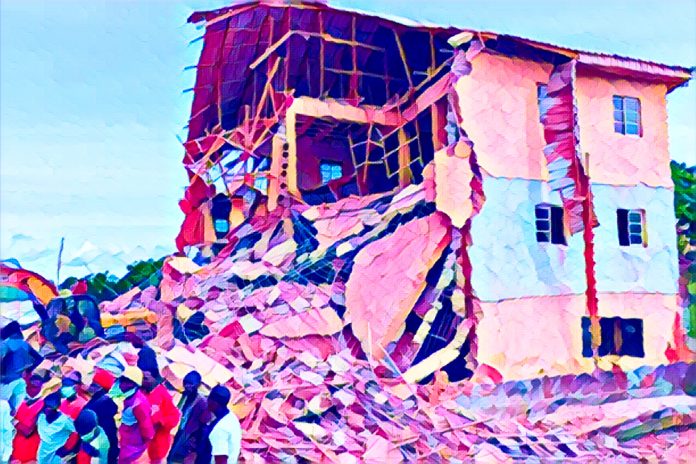Nigeria recorded 22 building collapses between January and July 2024, resulting in 33 deaths, according to the Council for Regulation of Engineering in Nigeria (COREN). COREN President Prof. Sadiq Abubakar highlighted the issue at a news conference in Abuja.
The conference, titled “The Incessant Spate of Building Collapse in Nigeria in Recent Times – A Call for Sustainable Collaboration by All Stakeholders,” revealed that Lagos accounted for 27.27% of the collapses. Abuja and Anambra each reported 18.18% of the incidents. Ekiti and Plateau followed with 9.09% each, while Kano, Taraba, and Niger states accounted for 4.55% each.
“Lagos leads in building collapses,” Abubakar stated. “Over 91 buildings have collapsed, causing over 354 deaths in Lagos from 2012 to date.”
In Abuja, about 30 buildings have collapsed since 1993, resulting in over 64 deaths and many injuries. Recent incidents include the collapse near DMGS Onitsha, Anambra on June 12, and a school building in Plateau on July 13, where 22 students died and 134 were injured. Another collapse occurred in Kubwa, Abuja.
“This situation demands reflection and collaboration among all stakeholders to stop this trend,” Abubakar said. “We extend our condolences to all affected families and commend emergency and security services for their prompt responses.”
Abubakar explained that the causes of building collapses vary by location. Aging buildings, substandard construction materials, and structural failures are common factors. Illegal modifications, unauthorized floor additions, inadequate supervision, and poor foundations also contribute. Corruption and sharp practices exacerbate the problem.
COREN praised state governments for forming panels to investigate the collapses. “This is not the time for blame but for unity in finding solutions,” Abubakar said. “All professionals in the built environment have roles to play.”
Illegal mining activities in residential areas also threaten structural stability. COREN urged affected states to address this issue and enforce compulsory insurance for buildings under construction.
In response to the crisis, COREN has taken steps to monitor and prevent building collapses. They have trained and licensed Engineering Regulation Monitoring (ERM) inspectors. The COREN Act has been amended to include enforcement responsibilities, leading to the creation of an ERM&E Task Force at regional levels. These regions include Ibadan, Port Harcourt, Enugu, Kano, the Federal Capital Territory, Gombe, and Lagos.
Abubakar called for increased cooperation among all stakeholders in the built environment. “This is a time for collaboration, not competition,” he said. “We must work together to prevent future building collapses.”
COREN’s efforts aim to ensure the safety and stability of buildings across Nigeria. By addressing the root causes and enforcing regulations, they hope to reduce the frequency of these tragic incidents.
The regulatory body is determined to make significant strides in preventing future building collapses. The training and licensing of ERM inspectors are part of this effort. The reconstitution of the Council Committee on Engineering Regulation Monitoring and the establishment of regional task forces further reinforce COREN’s commitment to tackling the issue.
Nigeria’s high rate of building collapses has prompted calls for urgent action. COREN’s initiatives are designed to enhance oversight and enforcement, ensuring that construction standards are met.
The recent collapses underscore the need for comprehensive strategies to address the problem. Effective collaboration among stakeholders, rigorous enforcement of regulations, and improved construction practices are essential to prevent future tragedies.
Nigeria is facing a critical challenge with building collapses. The loss of lives and property necessitates immediate and sustained action. COREN’s proactive measures and the cooperation of all stakeholders will be crucial in addressing this crisis and ensuring safer construction practices across the country.



